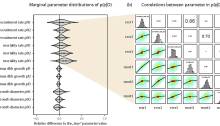Explaining the ABC-Rejection Algorithm in R
Approximate Bayesian Computation (ABC) is an umbrella term for a class of algorithms and ideas that allow performing an approximate estimation of the likelihood / posterior for stochastic simulation models when the likelihood cannot be explicitly calculated (intractable likelihood). To give you the idea in a nutshell: to approximate the likelihood, consider that for a…


